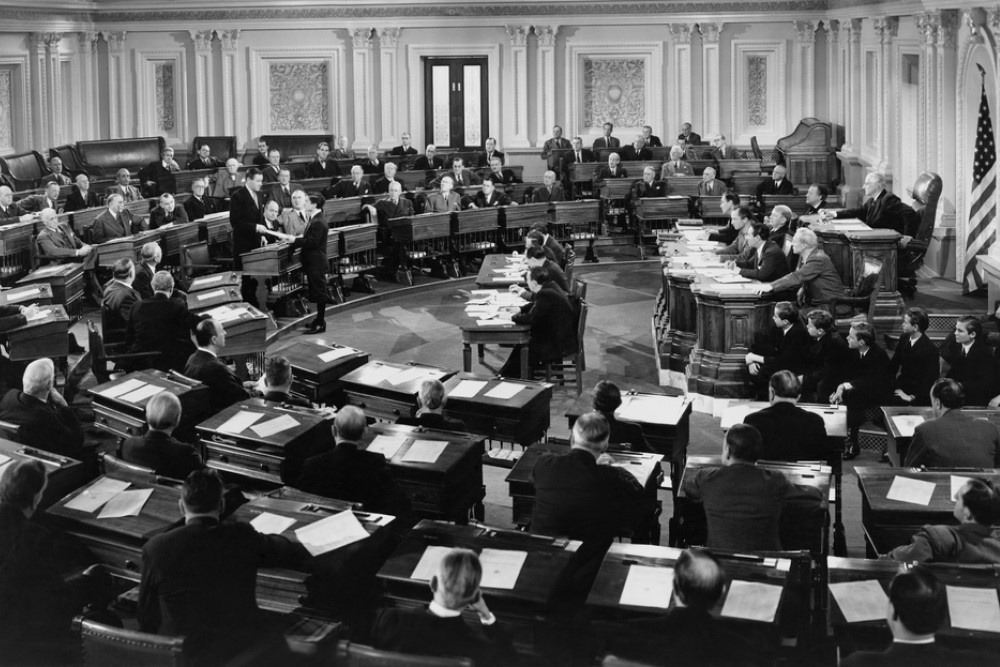The Broader Moral Issue Behind the Filibuster

This week, the American Rescue Plan became law after being passed along party lines despite overwhelming bi-partisan support from state and local figures as well as voters (according to opinion polling). The massive stimulus measure has been taken as an indication that “the era of big government” is back, and indeed given the challenges faced with COVID-19, the threat of climate change, the urgent need to rebuild crumbling infrastructure, it isn’t particularly shocking that a significant share of voters now want government to be more proactive. It should be no surprise then that the Senate filibuster continues to be a lightning rod of controversy as more Democrats have called for reform. But is this just politics or are there more subtle moral concerns at stake when it comes to changing the filibuster?
Those who oppose getting rid of the filibuster tend to point to three general reasons to keep it. The first is that the filibuster is in keeping with the general philosophy behind the Constitution, specifically to prevent swift passage of laws. The second is that the filibuster protects minority rights. The third reason is more political-practical in nature; warning of the dangers of what would happen if the other side were able to do as they wish, and nothing could be done to stop it.
In response to the first reason, two important points need to be noted. In a 1995 article defending the filibuster, Bill Frenzel notes, “The Framers created our system based on their profound distrust of government […] Their intention was to prevent swift enactment of laws and to avoid satisfying the popular whimsy of each willful majority.” However even if slow government was the goal of the Constitution, it isn’t clear that the filibuster was a good means of accomplishing this. James Madison argued requiring more than majority support would reverse “the fundamental principle of free government,” while Alexander Hamilton argued that such requirements serve to “substitute the pleasure, caprice, or artifices of an insignificant, turbulent, or corrupt junto, to the regular deliberations and decisions of a respectable majority.”
What is more important, however, is that the Framers of the Constitution were influenced by 18th-century political philosophy and were responding to 18th-century problems. So, the question is whether such conditions still hold today, and if we should be bound by what the Founders wanted? The answer appears to be no, as even Thomas Jefferson argued that the Constitution should be revised and updated to meet the needs of new generations. While it is tempting to think about political philosophy in a-temporal terms as establishing stable institutions to protect an invariant set of fixed human rights, we might instead consider political institutions the instruments that allow the public to conduct its business.
In response to the second reason — the protection of minority rights — the question is always one of which minority and which rights we are talking about. If we are talking about the rights of a minority of citizens against the tyranny of the majority, then we already have a solution to that; it’s called the Bill of Rights. If we are talking about the rights of a minority of Senators, then we need to ask how far those rights should be extended. The right to review and debate legislation is important for any legislator in the minority, but whether there is a right for a minority of lawmakers to effectively veto legislation is another. Senator Raphael Warnock, for example, recently posed this very question, asking whether the minority rights of Senators should outweigh the voting rights of citizens.
If we put aside the first two reasons, as, by themselves, they aren’t reasons to keep the filibuster specifically, we must address the actual perceivable consequences of making changes to lawmaking policy. For example, Mitch McConnell recently warned of a “scorched earth Senate” where Republicans would use every rule at their disposal to halt the chamber and once returned to the majority would pass all manner of laws unacceptable to Democrats with “zero input” from them.
First, it is worth noting that most other legislative chambers do not have a filibuster rule like the Senate, despite hailing from nations which rank high on the democracy index. For example, prior to the 1990s the Legislative Assembly of Ontario was far more permissive about the length of speeches, allowing one member to tie up the legislature for weeks, culminating in a 17-hour long speech. The rules of the legislature were later amended to limit the time for members to speak, but even after this filibuster was eliminated, there were plenty of opportunities for obstruction. For example, one member was able to tie up the legislature for hours by introducing a bill whose title included every lake, river, and steam in the province. The title had to be read aloud by the member and the clerk.
Despite eliminating the chance to filibuster, the sky did not fall in Ontario. Just as McConnell has threatened to tie up the Senate using tactics like having bills be read aloud, legislators in Ontario resorted to new tactics and procedural moves to obstruct which were only permitted until they also became a nuisance. Yet, what follows from jurisdictions that allow for the easy passage of legislation based on a majority vote? Firstly, it means that administrations are far more able to enact the platforms they run on. Thus, voters more often see their political preferences be reflected in law.
But this also means that a newly elected government can always repeal and replace what came before far easier. This can be problematic because it creates greater instability and uncertainty. Sometimes this happens as a major piece of legislation can be repealed in short order by a new government who may choose their own policies. Good examples in Canada include a national childcare program that was almost enacted before a newly elected Conservative government cancelled it. In Ontario, the Liberal government’s cap and trade program was abolished quickly by a new Conservative administration.
While the swinging pendulum of political winners does mean that laws and programs can be enacted and repealed more frequently, it is rarely a free-for-all either. Certain programs, policies, or laws simply have too much public support to allow new governments to wipe the slate clean. For example, even when Conservative governments enjoy large majorities and could easily do so, you don’t see them repealing programs like public healthcare because the public would not stand for it.
So would a filibuster-less Senate be a disaster? Certainly McConnell is right that even if Democrats pass all the legislation they want, Republicans can just as easily repeal it next time they’re in power and further enact all sorts of reforms that would be objectionable to Democrats. However, in the long term the back-and-forth of major legislative reforms, repeals, and replacements would not be sustainable. It is in the public’s interest to have some degree of stability even if it takes voters a while to realize this. However, this kind of legislative experimentation might make it easier for the public to connect policies and ideas with real-life consequences. It’s one thing to vote Republican if you know little can get done, it is another thing to vote Republican if you know they can and will take away your healthcare. And if they do, your future voting preferences might change. In essence, eliminating the filibuster reveals how important it will be for voters to be more informed advocates when it comes to policy and to be less inclined to knee-jerk defenses of ideology.
Reforming the filibuster may not be merely a matter of exacerbating political problems, but rather it reveals and identifies a moral one. In a time where political reform is easier without the filibuster, what kind of changes to political culture should result? What are our responsibilities to be informed when we vote? Given that fellow citizens may not agree with all of our policies and may have the option to repeal them in the future, are we obligated to seek input from opponents in order to ensure that policies have enough support not to be undone after the next election? Would a scorched-earth approach with “zero input” from the other side ever be a good thing? In essence, are we not forced to ask how we can better “get along” with opposing voter blocks and what would that look like? Could this actually lead to more compromise and less polarization? And in our present political culture, where is the line drawn between pure obstruction and a meaningful challenge from the voting minority? And if some obstruction is welcome to protect the rights of the minority, how far should those rights go?
As I said, even if you eliminate the filibuster there are other tactics that can be used, just as they were in Ontario. The issue will not just go away. The debate for the nation is not whether a legislative tactic should stick around, but about the kind of political culture we should have.




